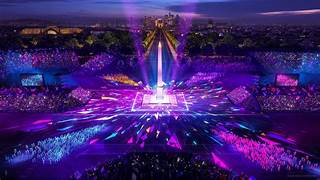Exploring the Unique Highlights of the Paris Paralympic Games 2024
SPORT
8/28/20247 min read


Introduction to the Paris Paralympic Games 2024
The Paris Paralympic Games 2024 mark a significant chapter in the history of the Paralympic movement. Since its inception in 1960, the Paralympic Games have grown not only in size but in global importance, serving as a cornerstone for inclusivity and athletic excellence. Paris, a city known for its rich cultural heritage and historical landmarks, lends an extraordinary backdrop to these Games, illustrating the merging of tradition and innovation.
Scheduled to take place from August 28 to September 8, 2024, the Paris Paralympic Games are set to welcome over 4,400 athletes from approximately 170 nations. This grand assembly underscores not just the competitive spirit of the event but also its role in uniting diverse cultures through the universal language of sports.
The choice of Paris as the host city is particularly special for several reasons. Paris previously hosted the Summer Olympics in 1900 and 1924, making the 2024 Paralympics part of a century-old legacy of world-class sporting events. The city’s world-renowned venues, such as Stade de France and the Champ de Mars, will serve as stages where exceptional athletes demonstrate their prowess and determination.
What makes the 2024 iteration of the Paralympic Games particularly unique is the emphasis on innovation and accessibility. The Paris 2024 Organizing Committee has outlined ambitious plans to transform the city's infrastructure to better accommodate individuals with disabilities. This entails not only improved accessibility in public transportation but also state-of-the-art digital services to ensure an inclusive experience for both participants and spectators.
Moreover, the inclusion of new and exciting sports adds a modern touch to the Games. From Para-taekwondo to wheelchair rugby, the expanded roster of athletic disciplines promises to offer exhilarating competitions and foster a broader appreciation for adaptive sports. The Paris Paralympic Games 2024 aim to leave a lasting legacy of improved inclusivity and accessibility, making it a remarkable milestone in the ongoing evolution of the Paralympic movement.
Inclusive Infrastructure and Venues
Paris has made significant strides in ensuring the 2024 Paralympic Games are inclusive and accessible for all participants. A cornerstone of this effort is the design and development of barrier-free infrastructure. Central to this initiative is the Stade de France, which has undergone extensive renovations to accommodate athletes with disabilities. These modifications include the installation of ramps, elevators, and specially designed seating areas, ensuring a seamless experience for both competitors and spectators with mobility challenges.
Beyond the Stade de France, Paris has also prioritized accessible transportation. The city's public transport system has been enhanced with features such as low-floor buses, tactile paving, and audible signals to aid visually impaired passengers. Additionally, numerous metro stations have been upgraded with elevators and wider gates, promoting ease of movement for wheelchair users. These improvements are aimed at providing a smooth and hassle-free commute for all attendees of the Paralympic Games.
One of the standout features of the Paris Paralympic Games is the implementation of assistive technologies. These include advanced communication devices for individuals with hearing impairments and accessible navigation apps tailored to the needs of the disabled community. Such innovations are designed to foster an environment that is not only inclusive but also empowering for the athletes and spectators alike.
Moreover, iconic venues like the Paris Aquatics Centre and Roland Garros have embraced inclusivity by integrating accessible seating, visual aids, and amiable service staff trained to assist individuals with various disabilities. These venues, now better equipped to host international competitions, reflect Paris's commitment to creating a welcoming and inclusive atmosphere for the global sporting community.
Overall, the extensive efforts undertaken by Paris to create accessible and inclusive environments for the 2024 Paralympic Games showcase the city’s dedication to promoting equality and accessibility. By upgrading infrastructure, enhancing transportation, and leveraging assistive technologies, Paris is setting a new precedent for future international sporting events.
Innovative Sports and New Events
The Paris Paralympic Games 2024 are set to introduce a series of innovative sports and events, marking a significant leap forward in the inclusivity and diversity of the Games. The inclusion of new sports is a meticulous process, guided by strict criteria set forth by the International Paralympic Committee (IPC). The criteria encompass aspects such as global popularity, strategic growth potential, and the ability to embody the Paralympic values of determination, equality, and inspiration.
Among the debut events, the addition of para-dance sport, para-climbing, and wheelchair 3x3 basketball has garnered substantial attention. These sports were selected not only for their wide appeal but also for the enhanced participation opportunities they present for athletes with a range of disabilities. The decision-making process involves in-depth evaluations, consultations with international federations, and an assessment of the sports' logistical feasibility within the Paralympic framework.
The introduction of para-dance sport exemplifies the cultural and adaptive evolution of the Games. Para-dance, characterized by its artistic and athletic rigor, enables athletes to express their abilities in an accessible yet challenging competitive environment. Similarly, para-climbing brings forth the thrill of scaling heights, a sport traditionally associated with adventure and resilience, now reimagined to include para-athletes. Wheelchair 3x3 basketball, a dynamic and fast-paced variation of the traditional wheelchair basketball, is expected to elevate the spectator experience with its intense and engaging format.
The impact of these additions on the Paris Paralympic Games 2024 is manifold. These new events not only boost the visibility and accessibility of adaptive sports but also drive inclusivity by providing a broader platform for diverse athletic talent. They underscore the ongoing commitment of the Games to adapt and grow, reflecting the evolving landscape of disabled sports. The introduction of these sports aligns with the broader goal of enhancing representation and enjoyment for both athletes and spectators, ensuring that the Paris 2024 Paralympics continue to be a groundbreaking and inclusive event.
Sustainability Initiatives and Green Games
The Paris 2024 Paralympic Games aim to set new benchmarks in sustainability, reflecting a commitment to environmental stewardship. Central to the organizing committee's vision are ambitious environmental goals aimed at minimizing the event's carbon footprint. One prominent objective is to host a carbon-neutral event, where innovative measures and green practices take center stage. By leveraging renewable energy sources, implementing waste reduction strategies, and incorporating sustainable building practices, the Paris 2024 Games aspire to be a paradigm of eco-friendliness.
Buildings and infrastructure play a crucial role in this green endeavor. The use of recycled materials is being prioritized, reducing the reliance on new raw resources. New construction projects for the Games are being designed to meet high environmental standards, such as the stringent criteria set by the Building Research Establishment Environmental Assessment Method (BREEAM). These facilities aim for energy efficiency and lower carbon emissions, fostering long-term sustainability.
Another significant aspect of sustainability at the Paris 2024 Paralympic Games is the promotion of eco-friendly transportation. Public transport systems, including buses and metro lines, are being enhanced to facilitate green travel for spectators and participants. The integration of electric vehicles and the expansion of bike-sharing programs further underscore the commitment to reducing reliance on fossil fuels. Efforts are also being made to encourage walking and cycling, offering convenient and low-impact travel options.
Real-world examples substantiate the anticipated environmental impact of these green initiatives. For instance, the organizers estimate a 50% reduction in carbon emissions compared to previous events, thanks to the combined efforts of using renewable energy and improved transport systems. Such initiatives underline a broader commitment to climate action and sustainable development. The Paris 2024 Paralympic Games, with these forward-thinking policies, not only promise an incredible sporting spectacle but also a landmark in ecological responsibility, setting a new standard for future global events.
Cultural Programs and Community Engagement
The Paris Paralympic Games 2024 are not just a showcase of athletic excellence; they are also an opportunity to highlight and celebrate the vibrant cultural fabric of Paris. Integral to this celebration are the myriad cultural programs and community engagement activities planned around the event. These initiatives aim to foster inclusivity, promote disability awareness, and create a legacy of social cohesion and cultural understanding.
A key component of the Paralympic Games is the cultural festivals that will envelop the city, featuring performances and exhibitions from local and international artists. These festivals will provide a platform for artists with disabilities, showcasing their talents and breaking down societal barriers. Collaborations with local schools and educational institutions are already in place, ensuring that students across Paris have the opportunity to engage with these programs. Educational initiatives, such as workshops and seminars, will aim to enlighten young minds about the importance of inclusivity and respect for all individuals.
Additionally, community engagement activities will be a cornerstone of the Paris 2024 Paralympic Games. Local organizations, charities, and social enterprises will work hand-in-hand with event organizers to roll out a series of initiatives designed to foster community spirit and engagement. These include community service projects, accessibility improvement drives, and inclusivity training sessions for businesses and public services, ensuring that the values of the Paralympic Games leave a lasting impact.
Notably, the collaboration with local artists stands out as a significant highlight. Art installations, public murals, and interactive exhibits will be integrated into the city's landscape, offering residents and visitors alike a chance to reflect on the themes of diversity, resilience, and human potential. These artistic endeavors will serve as a bridge between the sporting events and the broader community, underlining the universal message of the Paralympic Games: unity through diversity.
In conclusion, the cultural programs and community engagement activities around the Paris Paralympic Games 2024 are designed to enrich the experience for everyone involved. By weaving together sports, arts, education, and community service, the event promises to leave an enduring legacy of inclusivity and cultural vibrancy.
Legacy and Long-term Impact
The Paris Paralympic Games 2024 promise to leave a lasting legacy, not merely as a culmination of athletic excellence but as a beacon of societal change. A significant anticipated impact is the transformation in societal attitudes towards disability. The Games serve as a global platform showcasing the capabilities and triumphs of para-athletes, fostering a spirit of inclusivity and respect. It is expected that this global event will challenge stereotypes and misconceptions, encouraging a more nuanced and empathetic understanding of disability across various cultures.
This shift in perception is further bolstered by the promotion of inclusive sports. The Paris Paralympic Games are poised to inspire increased participation in adaptive sports, fostering a culture where physical activity and competition are accessible to all. Schools, community centers, and sports clubs will likely see a surge in demand for inclusive programs. Additionally, the visibility of para-athletes can inspire young individuals with disabilities to pursue their aspirations, knowing that the world of sports is open to them.
Moreover, the improvements in infrastructure catalyzed by the Games will have enduring benefits. Paris is investing substantially in making the city more accessible, with enhanced transportation systems, public spaces, and sports facilities designed to accommodate individuals with disabilities. These upgrades will remain long after the closing ceremonies, contributing to a more inclusive urban environment. Such infrastructure improvements are essential not only for residents but for visitors, promoting Paris as a model city for accessibility.
Furthermore, the city’s focus on sustainability and accessibility sets a precedent for future international events. By integrating these principles into the core planning and execution, the Paris Paralympic Games 2024 provide a blueprint for future hosts. This legacy encourages global organizers to prioritize inclusivity and accessibility, ensuring that advancements made in Paris resonate worldwide.
Paris's commitment to maintaining and building upon these advancements post-Games is crucial for long-term impact. Programs and initiatives launched in the lead-up to the Paralympics will need continued support to thrive and evolve. Through sustained efforts, Paris aims to ensure that the spirit of the Games endures, benefiting future generations and cementing its role as a champion of inclusivity.
TheTechStudioz©2023
Reframe your inbox
Subscribe to our Blog and never miss a story.
We care about your data in our privacy policy.
